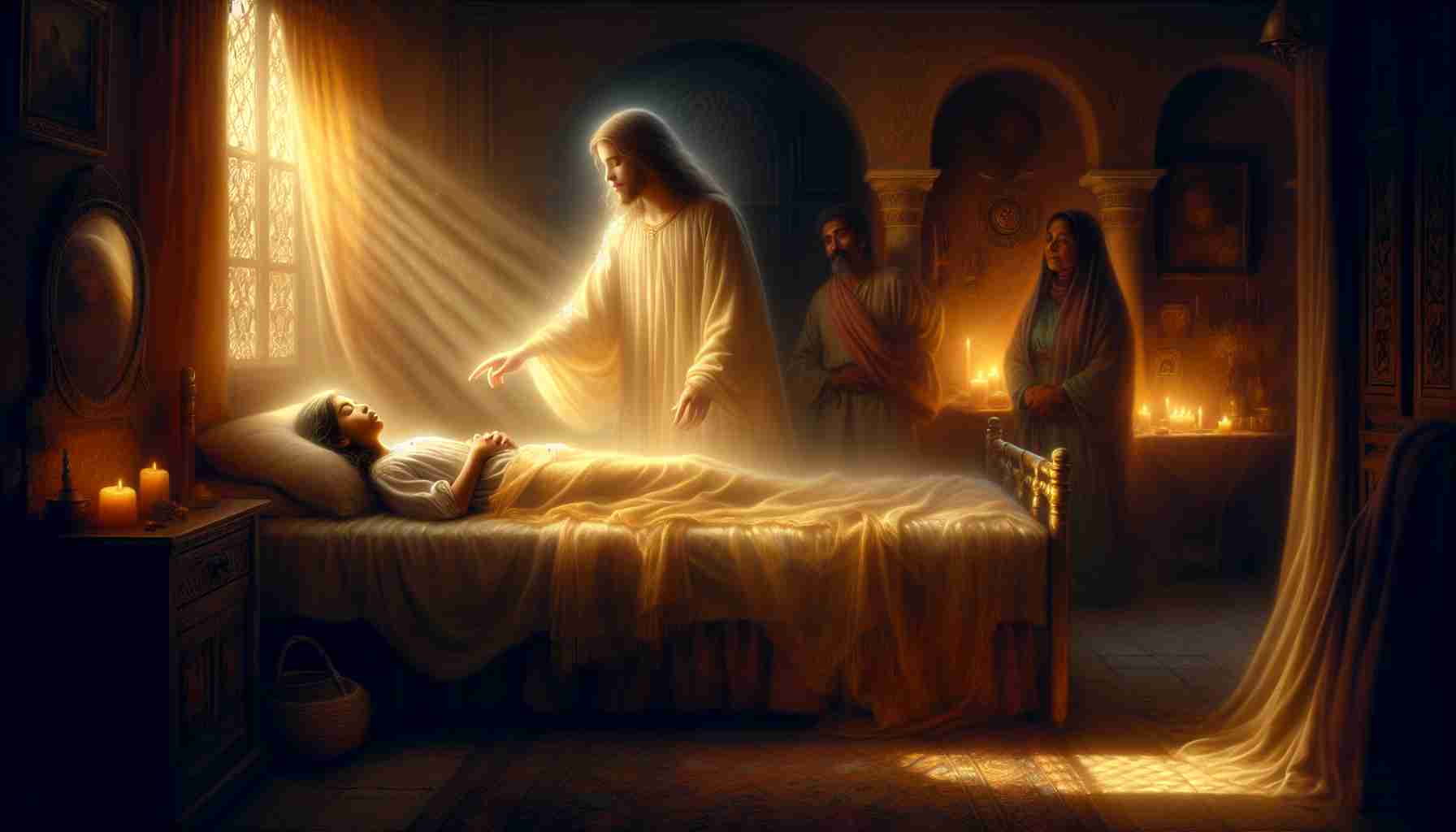

I stood at the edge of the courtyard, the hem of my tunic clutched in trembling hands. The house behind me pulsed with the sound of grief: flutes, wailing, a mother’s strangled sobs. I wanted to go in, to be by her side, but shame held me frozen. I’d failed them both. I—the great Jairus, ruler of the synagogue—had run through the streets and fallen at the feet of a teacher I once warned others about. Desperate men do desperate things.
The day had started with hope. We’d heard Jesus had returned by boat, and I didn’t hesitate. I pushed past Roman soldiers and startled merchants, through the press of a thousand pleading people. I collapsed before Him, not caring who saw. My daughter—my only child—was dying, and I believed He could save her.
But the crowd slowed us. Every step toward my house felt like a race against death. And then, she came. A woman, sick for years, pressing through the throng just to touch His robe. When He stopped to seek her out, I felt fury ignite in my chest. She’d stolen His time—my time. Every heartbeat loomed like a tolling bell.
And then, the messenger came with his terrible words: “Your daughter is dead. Why bother the Teacher anymore?”
I collapsed inside myself. The world narrowed into grief and shame. I hadn’t been fast enough. I hadn’t been faithful enough.
But Jesus—He looked at me. Not with pity. Not with rebuke. Just calm, steady compassion.
“Do not fear,” He said. “Only believe.”
I didn't understand why He kept going. Why He placed His hand on my shoulder like I still had something to hope for. I followed on legs that barely held me.
Now the house lay behind me, filled with mourners and judgment. They laughed when He said she was only sleeping. They didn’t know what I did: that this Man didn’t speak like others. He touched the untouchable. He spoke, and nature obeyed. He looked at me like He saw the weight I carried—the pride I wore like armor, the fear I hid under law—and still, He walked into my grief.
I blinked through tears as He took my daughter’s hand where she lay, still and pale.
“Talitha koum,” He said.
Little girl, get up.
Her eyes fluttered. Her chest rose. She sat up and looked for me.
And in that breath, the ache I had carried broke into helpless wonder. My knees buckled. I wept openly, no longer caring who saw. My daughter was alive. Not because I had authority, or worth, or perfect faith—but because He came anyway.
I stepped into the room, no longer Jairus the leader, but Jairus the father, the forgiven, the one who’d reached beyond pride and touched mercy.
She reached out for me. I held her, and whispered thanks through trembling lips.
Death had come. But now, life held her hand.
I stood at the edge of the courtyard, the hem of my tunic clutched in trembling hands. The house behind me pulsed with the sound of grief: flutes, wailing, a mother’s strangled sobs. I wanted to go in, to be by her side, but shame held me frozen. I’d failed them both. I—the great Jairus, ruler of the synagogue—had run through the streets and fallen at the feet of a teacher I once warned others about. Desperate men do desperate things.
The day had started with hope. We’d heard Jesus had returned by boat, and I didn’t hesitate. I pushed past Roman soldiers and startled merchants, through the press of a thousand pleading people. I collapsed before Him, not caring who saw. My daughter—my only child—was dying, and I believed He could save her.
But the crowd slowed us. Every step toward my house felt like a race against death. And then, she came. A woman, sick for years, pressing through the throng just to touch His robe. When He stopped to seek her out, I felt fury ignite in my chest. She’d stolen His time—my time. Every heartbeat loomed like a tolling bell.
And then, the messenger came with his terrible words: “Your daughter is dead. Why bother the Teacher anymore?”
I collapsed inside myself. The world narrowed into grief and shame. I hadn’t been fast enough. I hadn’t been faithful enough.
But Jesus—He looked at me. Not with pity. Not with rebuke. Just calm, steady compassion.
“Do not fear,” He said. “Only believe.”
I didn't understand why He kept going. Why He placed His hand on my shoulder like I still had something to hope for. I followed on legs that barely held me.
Now the house lay behind me, filled with mourners and judgment. They laughed when He said she was only sleeping. They didn’t know what I did: that this Man didn’t speak like others. He touched the untouchable. He spoke, and nature obeyed. He looked at me like He saw the weight I carried—the pride I wore like armor, the fear I hid under law—and still, He walked into my grief.
I blinked through tears as He took my daughter’s hand where she lay, still and pale.
“Talitha koum,” He said.
Little girl, get up.
Her eyes fluttered. Her chest rose. She sat up and looked for me.
And in that breath, the ache I had carried broke into helpless wonder. My knees buckled. I wept openly, no longer caring who saw. My daughter was alive. Not because I had authority, or worth, or perfect faith—but because He came anyway.
I stepped into the room, no longer Jairus the leader, but Jairus the father, the forgiven, the one who’d reached beyond pride and touched mercy.
She reached out for me. I held her, and whispered thanks through trembling lips.
Death had come. But now, life held her hand.